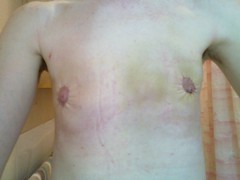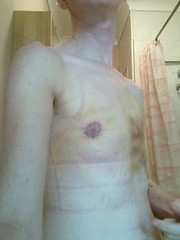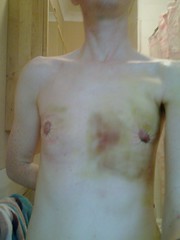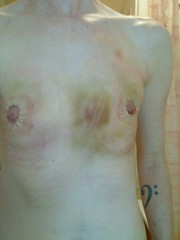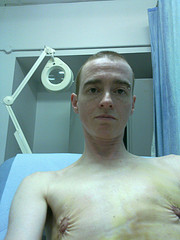I have just returned home from the US Embassy in London. In three weeks, a new passport with correct information will arrive by post. Huzzah!
Always be Prepared
This is a culmination of a much longer process. In May, I changed my name via statutory declaration. Then I contacted my phone companies to get them to change their records. I brought a copy of the form to my GP’s surgery. Most Brits change their name via deed poll, as it’s cheaper and easier, so the receptionist had never seen a statutory declaration before and was reluctant to accept it, but eventually did so. Then I went to my bank, who I hate with the fire of 999 suns, and they refused to let me change my name on my account at all, unless I could also provide photo ID in the new name. And finally, I went to my university, who updated my student records and ID card and printed out a letter affirming that I am a student there.
Then, I had to wait for phone bills to arrive in my name and to call BT more than once. And finally, appointment letters from the hospital where I had top surgery provided the final documents. So I then had three types of paperwork with my new name on it.
Shortly after I began compiling paperwork to change my name, the US State Department changed their rules about gender markers on passports. The letter I was planning on asking my surgeon for would no longer count. However, a letter from my GP would suffice. I asked him to write one saying I had completed transition, as then I could get a full term passport instead of a two year one. And, indeed, under the terms of the new regulations, I have completed transition. I find this to be entirely reasonable, as nobody would mistake me for a woman if they saw me or talked to me and the state of the parts of me covered by clothes are nobody’s business but those in who’s company I choose to disrobe.
My GP wrote the letter and charged me £25 for it. When the surgery’s receptionist asked me to pay, I was initially surprised, but then went to a bank and got some cash. GP practices are privately owned and the money they get from the NHS doesn’t cover things like letters to foreign governments. If this had been a problem for me, I think I could have gotten the Charing X psychiatrists to write a letter for me. That would also be acceptable to the embassy, but it’s over a month until I even see them again.
Armed with all of this paperwork, I made an appointment to go to the embassy, as you can’t just turn up. I began to fill out the application forms. They wanted to know if I had ever been married and what was the date of that and what was the date of my divorce. The divorce date, I remember. The date of the marriage? Not so much. I went back reading through old blog posts, seeing if I could figure it out. The ceremony was on day, but a paperwork snafu meant we got the license on the following monday . . . finally, I made a guess. And then I remembered the Defence of Marriage Act.
Every country in the world considers me to be legally divorced, except for my home country, where they hold that I was never married at all. When I was in Holland, I had to get a certificate to say I wasn’t currently married, so I have US Government-issued documentation that says I’m divorced, but they don’t actually back that statement. The state of California, however, also considers me to be divorced, as do five other states. It’s a strange sort of feeling, the one of non-recognition. The marriage may not have felt real, but the divorce certainly did. All those documents and lawyers fees and bitter acrimony never actually happened according to the great country of my birth. Obama said something about overturning that law, the one that says that years of my life weren’t real, but he didn’t actually mean it.
Today
The embassy makes people queue outside, on the pavement. Fortunately, the weather was sunny. I waited for a while with non-US citizens and then got into the correct queue. I knew one of the security guards from when I played in the gay band. She came over to chat and then came back to let me skip ahead of the queue. I appreciated the gesture and it made me a lot less nervous, actually. ID checks and pat downs make me nervous, for obvious reasons. She was cool. I did feel a bit guilty about queue-jumping though. I hadn’t brought my phone, although I could have and they would have held it for me. They took my USB stick and my Boris Bike fob.
The architecture of the US embassy is somewhat reminiscent of the Lincoln Center in New York. It’s sort of brutalist concrete, but with a lot of decorative corrugation. Inside the waiting room, there are gold-coloured metal columns. I wish I’d got a picture of it, but, of course, cameras are not allowed. I also wish I’d gotten a picture of the sign that sad to beware of terrorist bombs. “If you suspect something, call 999.” it said in small print at the bottom. I sat in one of the several rows of chairs and waited to be called.
Over the course of the last week or so, I’ve had an email correspondence with an embassy worker who was not very informed about new State Department rules. She seemed to think a surgery letter was still required. She asked for a “background statement,” something left undefined. When I asked for more information, I was instructed to ask for a particular staff member when I got there. So when I was called to the window, I asked to speak with the staff member with whom I had been having emails. She was a posh woman, apparently the manager. She told me to go to a window in a private chamber – a room with a door, however the walls don’t go up all the way to the ceiling, creating an illusion of privacy where none exists.
She started to ask about my medical history. Had I fully transitioned surgically? It seemed as if she was trying to be delicate while enquiring about the state of my genitals. In fact, the State Department has no right to any information beyond the letter written by my GP. What operations I have or have not had are none of their business. I explained that under the new rules, the letter from my GP should suffice. She said that the letter was only good for a two year passport.
The hassle of a two year passport isn’t just that I would need to return to the embassy every 18 months. The UK will not issue me a visa that extends longer than my passport, so my plans to get a two year work visa after graduating would become much more of a bother. Also, I would have to produce a new GP letter every time and appear in person with it. Otherwise, I would revert back to my initial state.
I argued that this is not what the new rules said and I was certainly not going to disclose information to which she had no right. I had the distinct impression that she just wanted me to declare that I’d had surgery, not actually provide documentation of it. I refused to budge, but the strength of my principles was somewhat undermined by the fact that one of the documents I brought to demonstrate that I’d changed my name specifically mentioned “mastectomy for transgender.” She called me up later to say that document would do nicely, but they were going to have to write to the States for guidance on the new rules. I hope they are provided with ample clarification. Indeed, plastic surgeons are not even on the list of doctors allowed to provide documentation.
The first time I spoke with her, she noted that she had seen a lot of this sort of thing before, and I certainly wouldn’t be the last. Perhaps she was trying to appear professional, but it was more of a knowingness, like she was an anthropologist and I was an exotic subject of study, about which she might one day write a book. So despite, apparently, being entirely successful in my mission to change my name and gender on my passport, I was still fairly wound up when I left. I rode a Boris Bike home, pedalling away my annoyance. Mostly.





